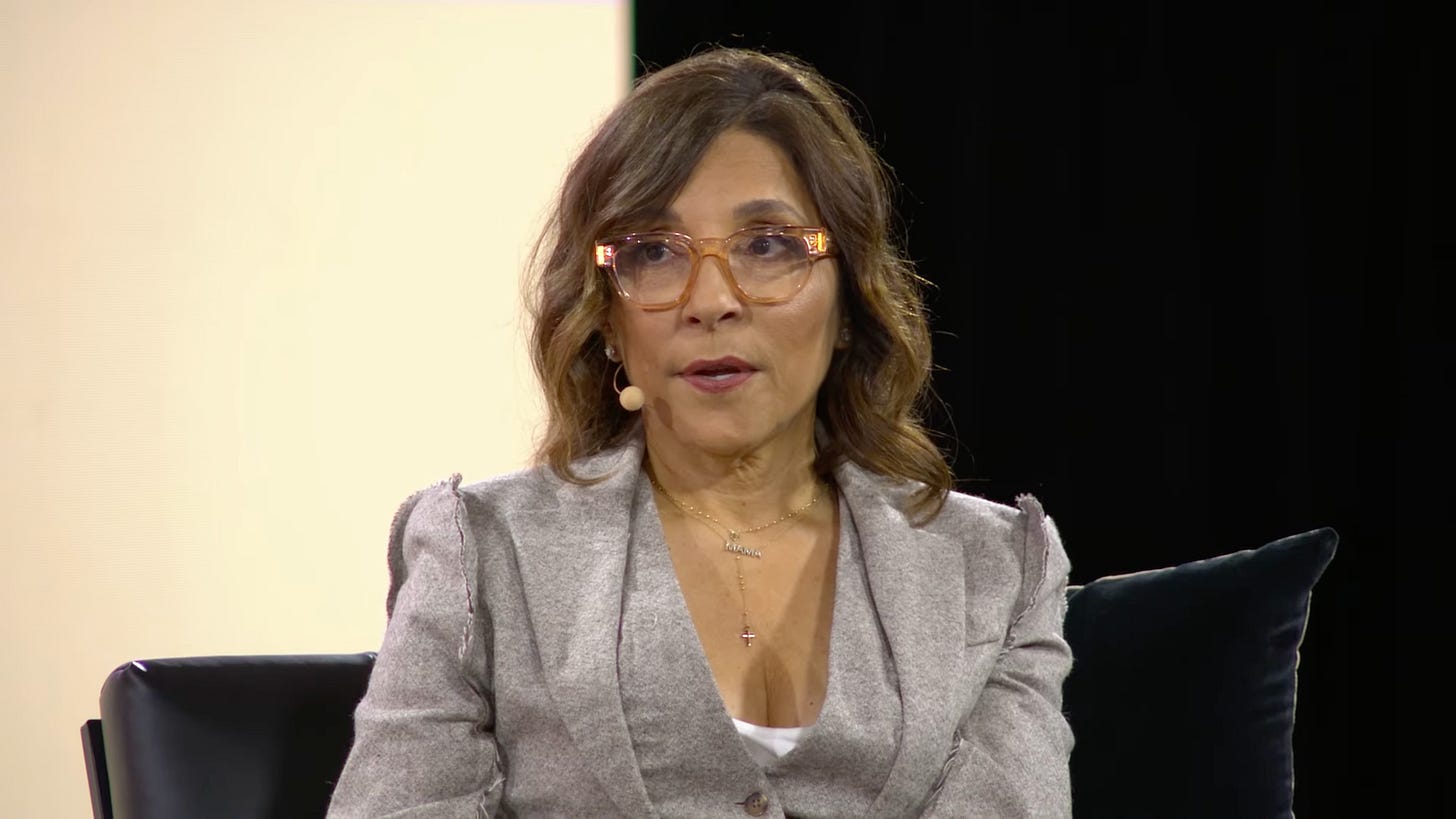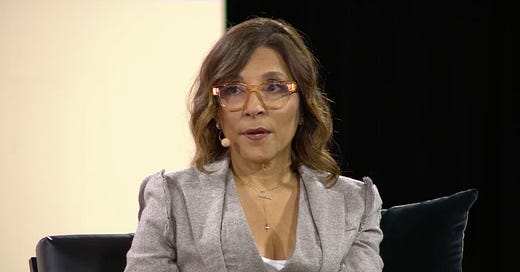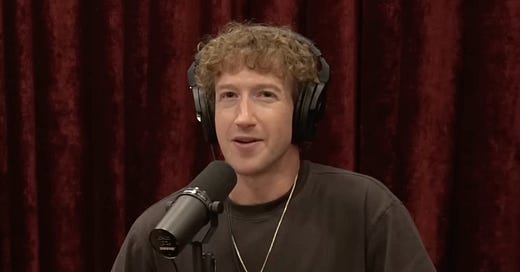
Discover more from Disconnect
Has Linda Yaccarino lost it?
An awkward interview at the Code Conference provides even less faith X has a path forward

On Wednesday afternoon, X CEO Linda Yaccarino was onstage at the Code Conference being grilled by CNBC journalist Julia Boorstin — and it wasn’t going well. As things went from bad to worse, Yaccarino tried to appeal to the audience for support. “Who wouldn’t want Elon Musk sitting at their side running product?” she asked, expecting an enthusiastic response. Instead, she was greeted with many more laughs than raised hands. After more than a decade where he could do no wrong, the mood on Musk has conclusively changed, but Yaccarino didn’t seem to have gotten the memo.
Back when Steve Jobs was at his peak, people used to talk about his “reality distortion field.” The Apple CEO had a way of winning people over and making them see the world through his eyes — whether they were his employees, journalists who were supposed to be holding him to account, or customers who anxiously awaited whatever he was going to entice them to buy next. But that meant many people ignored his abusive behavior and the externalities of Apple’s business model because they didn’t fit with the image Jobs was selling.
Once Jobs died, many in the industry anointed Musk as his successor — the next figurehead of Silicon Valley. Musk had a powerful reality distortion field of his own, but now that its power is eroding, it’s even more striking to see people who are still under its spell. Yaccarino, as Musk’s latest devotee, appears to be living in a fictional world of his creation, and it doesn’t bode well for the platform formerly known as Twitter, nor her professional future.
A shambolic performance
Yaccarino is nearing 100 days as X CEO and it seems she’d agreed to the Code interview to champion her successes over that period. She wanted to show she’s in command of the company — critics be damned — and has been addressing the serious issues customers and advertisers have been concerned about. Instead, she gave an awkward and combative performance filled with platitudes and personal anecdotes instead of tangible examples of how the company is climbing out of the hole Musk so firmly sunk it into.
There are several things Yaccarino wanted to make clear. First, that X is not Twitter. The way she sees it — or Musk has told her to see it — is that Twitter is a legacy company that’s now firmly in the grave, while X is an exciting new company “building a foundation based on free expression and freedom of speech” that can only go up. Back in February, I explained that Musk bought Twitter to try to relive his startup days and revive his idea for a platform called X. Yaccarino’s perspective on the company, paired with the “hardcore” attitude Musk expects of X employees, once again shows that Musk’s mid-life crisis has sent him scrambling for the comfort of his past.
Elon Musk wants to relive his start-up days. He’s repeating the same mistakes.
Second, she wanted to show that she’s more than NBCUniversal’s former head of global advertising. At one point, after being challenged on what she actually does at the company and whether she’s more of a Chief Operating Officer or even “CEO in name only,” she asked Boorstin, “Do you think Elon brought me to the company to be the head of advertising? … Or do you think he brought me to run the company and to deliver to our users the best possible experience?” She wanted to present herself as a “provocateur” or “heretic” who called things out and pushed legacy companies into the technological future in her previous roles. She wanted to be seen as CEO material, and as one equipped to survive the demands of the tech industry.
But between her stilted delivery, lack of command of the reality of the company, and inability to meaningfully respond to any of Boorstin’s lines of questioning, she came off as anything but the competent leader she wanted to show herself to be. Pressed on declining usage metrics and the continued problem with hateful speech on the platform, she could only say the numbers were trending in the right direction and that the company had rolled out a whole range of new trust and safety tools under her leadership, without being able to expand on what any of them were.
To hear Yaccarino describe it, you’d imagine X is constantly taking down the vile content being posted by the bigoted accounts Musk increasingly associates himself with and that X cares far more about brand safety and content moderation than the Twitter that preceded it. But as we all know, nothing could be further from the truth. Even advertisers — the people she’s supposed to understand best given her previous role — are still concerned about having their ads running against violent and extremist posts. The National Football League is just the latest to complain to X because its ads were being served up on the accounts of prominent white nationalists.
At one point, when Boorstin asked about Musk’s stated plan to charge everyone a subscription fee, Yaccarino had to ask Boorstin to repeat the question and soon after told her she simply wasn’t asking the right ones (or at least the ones Yaccarino wanted). Later, Yaccarino seemed to be distracted by her phone, then held it up and claimed she’s always checking X. Meanwhile, she rarely tweets anything that doesn’t seem written by a PR person and, as one Twitter user pointed out, doesn’t even have the X app on her home screen.
But more than anything, the interview showed her fealty to Musk. Yaccarino asked Boorstin if she’d read Musk’s new biography by Walter Isaacson, then recommended an interview Isaacson did with C-SPAN. She talked about how “in awe” she was of Musk’s availability to her and how supportive he was. When Boorstin presented her with Musk’s comments on planning to sue the Anti-Defamation League, Yaccarino responded that Musk was holding a Spaces to show he wasn’t anti-Semitic. “Everybody deserves to have the opportunity to speak their opinion, no matter who they are, including Elon,” she said. “Including you, Julia.”
Setting herself up for failure
The entire display wasn’t reassuring for the future of X/Twitter. Yaccarino is due to meet the bankers who financed Musk’s takeover of Twitter next week to present them with a plan for the company to actually make some money. The previous plan she presented alongside Musk in June hasn’t panned out, and given how much the value of the company has fallen because of Musk’s decisions, they’ll be looking for reassurance that Yaccarino can deliver. Her interview at Code suggests that’s unlikely.
Last month, I wrote about why I believed Yaccarino took the job of X CEO. In short, she wanted to become a CEO and it was clear NBCUniversal was not going to let her make the jump into the top job, so she decided to pursue the position at Twitter to prove her mettle and use it as a stepping stone to becoming CEO at a larger company. It was a big risk, and if anything it increasingly looks like she made the wrong call. Because of Musk’s increasingly unhinged behavior, it’s not going to be possible to turn the company around or show she has what it takes to lead a large company.
Why did Linda Yaccarino join Twitter?
Yaccarino’s performance at Code leaves one to wonder whether she’s truly caught up in Musk’s spell or is simply playing the part she knows is required to maintain his support in the role. I think the truth is that it’s a mix of both. While she was constantly praising Musk and X/Twitter in the interview, she was also deceptive about her love of the platform and how much she uses it — she’s clearly not a power user, regardless of what she suggests.
In a recent profile of Yaccarino in the Financial Times, an unnamed source with knowledge of their working relationship said, “You will not get to control Elon, you have to roll with the punches and channel him. If he says the sky is bright pink, you have to say you’re excited the sky is pink.” That helps to explain why she’s singing his tune so thoroughly and praising whatever ridiculous statements he makes about the future of the company. She knows that if there’s any chance of success, that’s a task she has to perform, but you can also see her trying to reframe herself at the same time.
Remember that during the interview, she was constantly pushing back any time Boorstin suggested her history was as an ad executive. “I think my background is being a very senior executive,” she said one of the times Boorstin referred to her advertising experience. To survive as X CEO, she has to praise Musk and stay on his good side, but she’s also trying to use the platform she’s been given to present a different narrative of herself in preparation for her future attempt to move to another company.
The problem is that keeping Musk happy and proving she can be a good CEO are likely to require very different actions. Publicly, she looks like a sycophant who’s going along with whatever Musk says as he continues to embrace far-right conspiracies and drive the company into the ground. Being the supposed captain of a ship who doesn’t have the authority to turn it away from an iceberg that will sink it to the bottom of the ocean isn’t going to help her prove she’s worthy of taking on a bigger job.
The FT profile backs up my argument that she’s hoping to move to a different company. It even cites Disney CEO as a position she has her eye on. But if she really thinks she has any chance of getting it, she can think again. She’s tied herself to the mast of X, and she’ll be going down with the ship as Musk takes the last lifeboat for himself.











